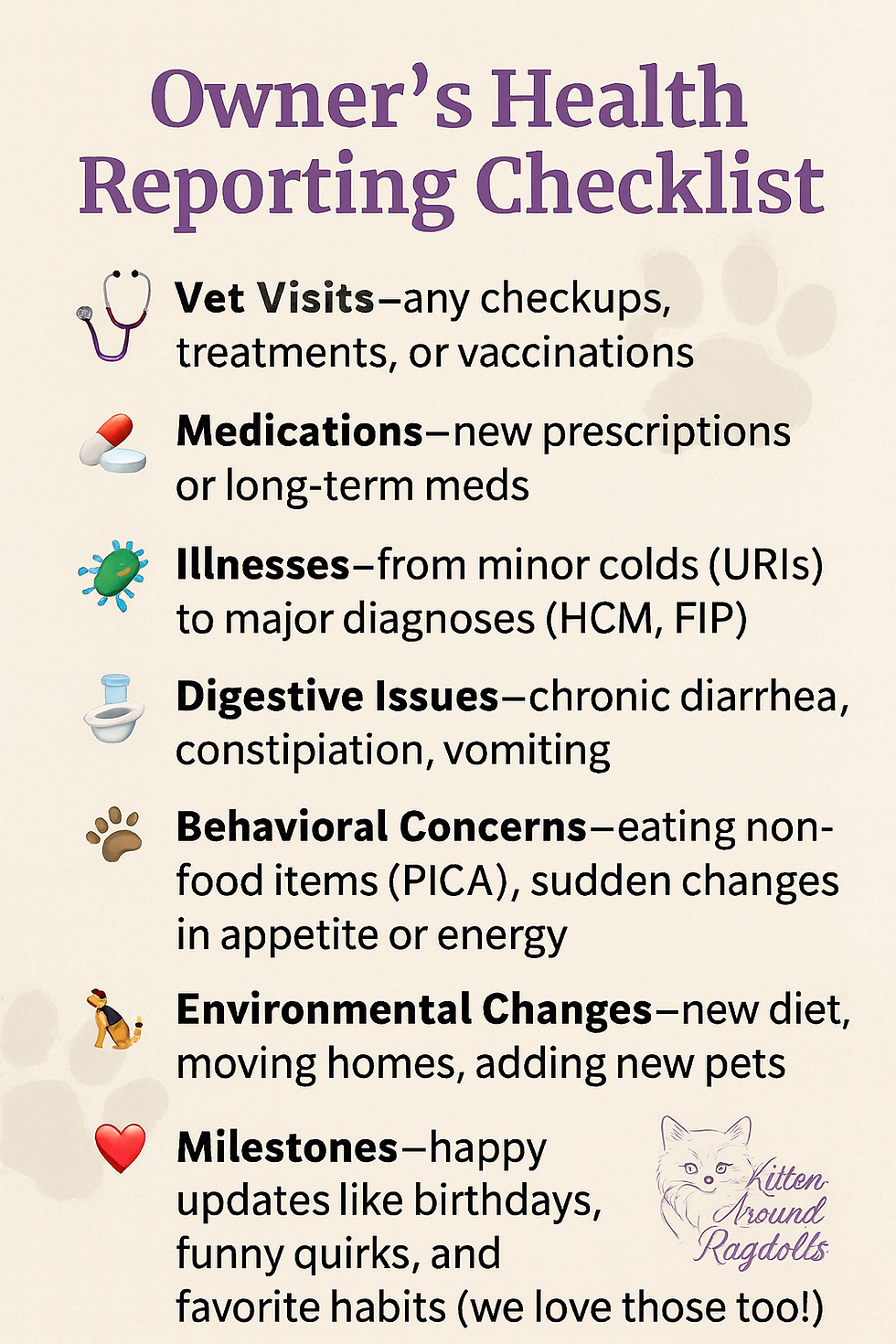Why You Must Report Any Health Issues to Your Breeder
- Kitten Around
- Aug 31
- 3 min read
Adopting a kitten is the beginning of a lifelong relationship—not only with your cat, but also with your breeder. At Kitten Around Ragdolls, we emphasize that staying in touch with us about your cat’s health is just as important as providing love and care at home.
Why? Because reporting health issues to your breeder helps us protect the future of the breed while giving you the support you need as an owner.

Ethical Breeding Relies on Health Tracking
Any truly ethical breeder carefully tracks the health of every kitten they produce. This information allows us to:
Monitor the long-term health of our breeding lines
Identify potential genetic risks early
Improve breeding decisions to ensure healthier kittens in the future
When owners keep us informed, we can ensure that Ragdolls remain the strong, healthy, and loving breed they are meant to be.
We Want to Know the Good, the Bad, and the Ugly
Some owners hesitate to report health issues because they fear blame. At Kitten Around Ragdolls, we want to be clear: we are not here to judge you—we are here to support you.
We appreciate every update, whether it’s a happy milestone or a difficult moment. Over the years, we’ve had reports ranging from a kitten who tragically lost an eye due to an accident, to another who contracted a preventable disease and passed away. These stories matter. They help us learn, adapt, and continue improving our program.
It’s Not Just About the Big Things
Many people assume we only need to know about serious conditions like HCM (Hypertrophic Cardiomyopathy) or FIP (Feline Infectious Peritonitis). But smaller issues matter too, because they can reveal patterns across related kittens.
We want to know about:
Recurrent UTIs (urinary tract infections)
URIs (upper respiratory infections)
Chronic diarrhea or digestive issues
Allergies or food sensitivities
Behavioral concerns tied to health (like chewing non-food items)
Even what may seem “minor” helps us build a complete health record for each bloodline.
An Example: When a Kitten Shows Signs of PICA
Recently, an owner contacted us about their kitten eating non-food items such as blankets and stuffing. This condition is known as PICA and often points to a nutritional deficiency.
Because Ragdolls grow continuously until about four years of age, they need a high-quality diet to support their development. This is why we recommend free-feeding kittens on premium food such as Wellness Core or other high-protein, grain-free, filler-free brands.
In cases like this, we can often offer advice or recommend when to see a vet—sometimes preventing bigger issues before they start.
Reporting Health Issues Helps You, Too
When you report health updates to your breeder, you’re not just helping us—you’re helping your cat. Because we’ve raised many kittens and seen a wide variety of health situations, we often have insight that can:
Suggest at-home care to try first
Provide questions to ask your vet
Identify whether an issue might be diet, environment, or genetics
Reassure you when something is normal and temporary
Your breeder is part of your cat’s lifelong care team.
Please Keep Us in the Loop
Whenever your Ragdoll has a vet visit, is prescribed a new medication, or begins a special diet, we want to hear from you. Even a quick message helps us build an accurate health history for your cat and their relatives.
These “FYI updates” are deeply appreciated. They not only strengthen our program, but also help us be better prepared to support you.
Final Thoughts
When you adopt from Kitten Around Ragdolls, you gain more than a kitten—you gain a lifetime partner in your cat’s journey. By reporting health issues to your breeder, you help us protect the future of Ragdolls, improve the health of our lines, and ensure that your cat receives the best possible support throughout their life.
📧 Email: kittenaroundragdolls@gmail.com🌐 Website: www.kittenaroundragdolls.com
.png)






